Original Lionesses: 'We had it rough, we had to really fight'
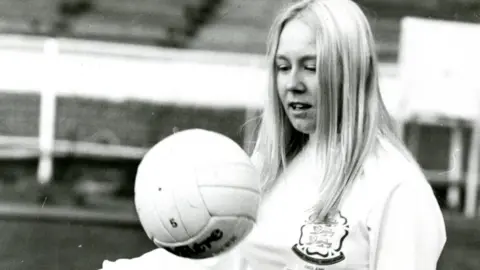 Courtesy of the National Football Museum
Courtesy of the National Football MuseumAs the Lionesses' continue to celebrate their Euro 2022 victory the original England Ladies reflect on their experiences more than 40 years ago.
They played on pitches "like ploughed fields", had to pay their own fares to matches and are still campaigning to be given official caps.
One retired aged 19 when she could not get time off work to play.
But the original Lionesses, the team who played their international matches during the 1970s, are proud of what they achieved.
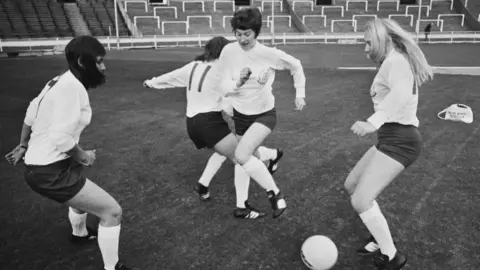 Getty Images
Getty ImagesThey played their first home international at Nuneaton's Manor Park pitch, beating Scotland 8-0.
Pat Mitchell-Firth, Jeannie Allott and Sue Whyatt were 16 when they took to the field in 1973.
"Girls weren't supposed to play football, they were supposed play with dolls houses and stuff," Mitchell-Firth, now 65, said adding she cried when the final whistle of Sunday's win against Germany was blown.
"The squad and the back room staff are just one team and that showed," she said of the Wembley match.
"We had nothing like that, we had one trainer who sometimes doubled up as a physio."
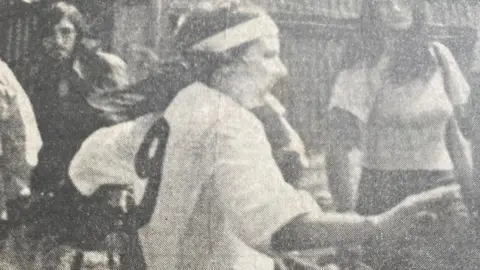 Pat Mitchell-Firth
Pat Mitchell-FirthGrowing up near Leeds, after being spotted as a nine-year-old playing in the park, she was allowed to play with boys for Swillington Saints under-12s.
The league became a "friendly league", not associated with the FA, in order to let her play.
However, at the age of 12, she had to leave and instead joined a pub team before being invited to join the Fleece Fillies in Ossett, Wakefield.
From there, she was put forward for trials for the first women's England squad.
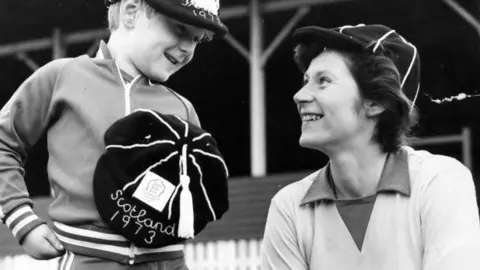 Sheila Parker
Sheila ParkerShe made her debut at Nuneaton, scoring a hattrick in front of a crowd of 1,308.
"We have got a saying that when we played for England it was one man and his dog watching, I think in Nuneaton it was something more like 12 men and their dogs watching...but no I felt dead proud and, sort of, being 16 I didn't expect to get picked so it was a bit of a shock.
"It is a great feeling pulling on the England shirt, I am a proud Yorkshire lass, proud to come from England, I don't suppose I can explain but I was playing with pride, like the girls (on Sunday).
"If you spoke to any ladies who played in my era they would all say the same, we are proud we were there to start it all off, everything has to start somewhere."
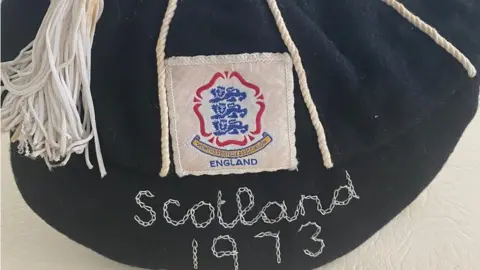 Pat Mitchell-Firth
Pat Mitchell-FirthThe team received handmade caps, she said, made by Flo Bilton from the Women's FA, and have an ongoing campaign to be recognised with an official cap.
The FA has said it will honour the England players who played under both The Women's FA and The FA from 1972 until the present day, in the autumn.
"We had it rough, we had to really fight, what we are fighting for now is that cap," teammate Jeannie Allott, 65, said.
After playing in the match at Nuneaton, she went to play for KFC in Holland and also represented the Netherlands.
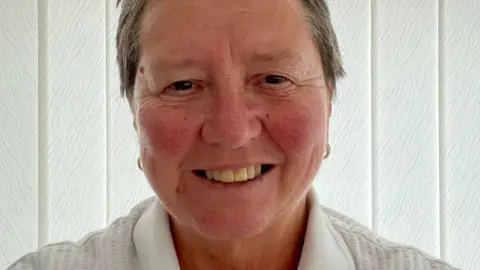 Pat Mitchell-Firth
Pat Mitchell-FirthAllott, originally from Crewe, and who played for Foden, said women who got the call up for England would have one training session the day before their match.
"It was not like now when they are training for weeks on end, there was no time for that, you would get on pitch, give all you had got and see how it goes after 90 minutes."
"You always had these negative remarks from men like 'Oh you should be behind the kitchen sink' but after the match they changed their tune," she said.
"I feel proud...this team got the ball rolling, and we should never be forgotten.
"We were the basis of ladies football and I'm proud."
 Jeannie Allott
Jeannie AllottSubstitute goalkeeper Sue Whyatt, who came in on in the 64th minute of the game, said the game was likely played at Manor Park as it was "the only one that would let us play".
A ban on women playing had been lifted by the FA, but there was "still a lot of pressure on people not to let us play," she said.
The pitch has since been demolished, making way for housing.
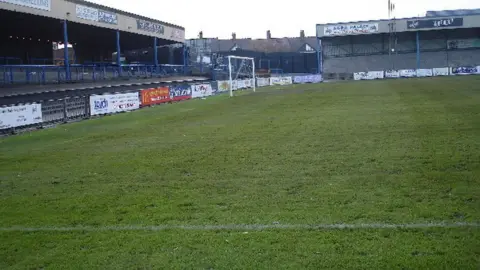 Peter Lloyd
Peter LloydWhyatt remembers the team playing on pitches like "ploughed fields" and having to "brush water and mud out of the goal area to be able to play" during some matches.
"We had to pay our own train fares. When we played against France my mum and dad had to find £50 for me to be able to go ,"she said.
"Nuneaton wasn't so bad because it was more in the summertime, it was quite a decent pitch.
"To stand there in an England shirt and have the national anthem played, no matter how small the crowd was amazing, even now it brings a lump to my throat…it meant the world to me.
"I have lovely kids and grandchildren and it still doesn't top standing there on that field, they know I say that."
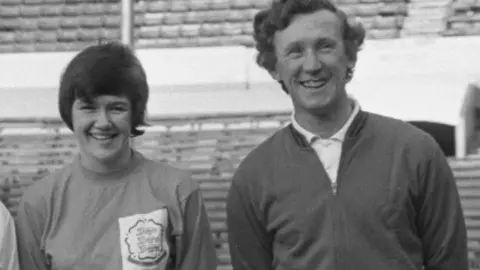 Getty Images
Getty ImagesWhyatt, 66, from Macclesfield, retired from football at 19 when she became a policewoman.
"Although I was promised when I joined the force I would be able to play football, when it came to it there weren't many females in the police so they wouldn't give me the time off to play," she said.
"It was give it up or give up the police and obviously I needed a wage."
She said it was "wonderful to see how far the game has come" and praised the "wonderful women" who fought for the sport to be recognised.
"Some of girls I played with would not have been disgraced on that team...if they had those resources they would have been there," she said.
"I feel so proud of it that we were the first, we were the pioneers."
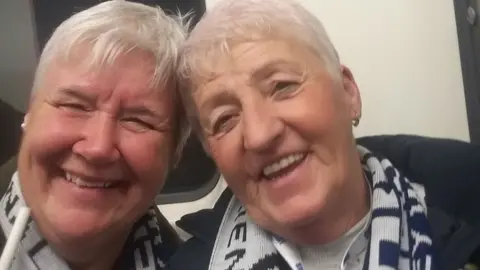 Sue Whyatt
Sue Whyatt
Follow BBC West Midlands on Facebook, Twitter and Instagram. Send your story ideas to: [email protected]
